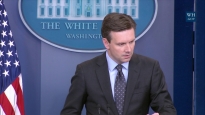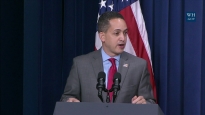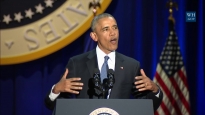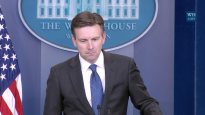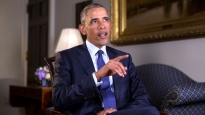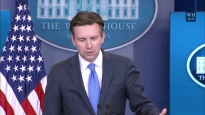President Obama Speaks on Consolidating Government Departments to Encourage Business
January 13, 2012 | 16:08 | Public Domain
The President announces a plan that will consolidate the six major federal departments and agencies that focus on business or trade into one leaner, more efficient department tasked with boosting American business and promoting competitiveness.
Remarks by the President on Government Reform
East Room
THE PRESIDENT: Good morning, everybody. Please have a seat.
Welcome to the White House. I see all sorts of small business people here, and I am thrilled to have you here. As small business owners, you know as well as anybody that if we’re going to rebuild an economy that lasts -- an economy that creates good, middle-class jobs -- then we’re all going to have to up our game.
The other day, I met with business leaders who are doing their part by insourcing -- by bringing jobs back to the United States. And I told them that if you are willing to keep asking yourselves what you can do to bring jobs back, then I’ll make sure that you’ve got a government that helps you succeed.
And that’s why we’re here today. I ran for office pledging to make our government leaner and smarter and more consumer-friendly. And from the moment I got here, I saw up close what many of you know to be true: The government we have is not the government that we need.
We live in a 21st century economy, but we’ve still got a government organized for the 20th century. Our economy has fundamentally changed -- as has the world -- but our government, our agencies, have not. The needs of our citizens have fundamentally changed but their government has not. Instead, it's often grown more complicated and sometimes more confusing.
Give you a few examples. There are five different entities dealing with housing. There are more than a dozen agencies dealing with food safety. My favorite example -- which I mentioned in last year’s State of the Union address -- as it turns out, the Interior Department is in charge of salmon in fresh water, but the Commerce Department handles them in saltwater. (Laughter.) If you’re wondering what the genesis of this was, apparently, it had something to do with President Nixon being unhappy with his Interior Secretary for criticizing him about the Vietnam War. And so he decided not to put NOAA in what would have been a more sensible place.
No business or nonprofit leader would allow this kind of duplication or unnecessary complexity in their operations. You wouldn’t do it when you’re thinking about your businesses. So why is it okay for our government? It’s not. It has to change.
Now, what we’ve tried to do over the first three years of my administration is to do a whole range of steps administratively to start making processes, procedures, agencies more consumer-friendly. But we need to do more, and we need authority to do more.
So today, I’m calling on Congress to reinstate the authority that past presidents have had to streamline and reform the Executive Branch. This is the same sort of authority that every business owner has to make sure that his or her company keeps pace with the times. And let me be clear: I will only use this authority for reforms that result in more efficiency, better service and a leaner government.
Now, a little bit of history here. Congress first granted this authority to presidents in the midst of the Great Depression, so that they could swiftly reorganize the Executive Branch to respond to the changing needs of the American people and the immediate challenges of the Depression. For the next 52 years, presidents were able to streamline or consolidate the Executive Branch by submitting a proposal to Congress that was guaranteed a simple up or down vote.
In 1984, while Ronald Reagan was President, Congress stopped granting that authority.
And when this process was left to follow the usual congressional pace and procedures, not surprisingly, it bogged down. So congressional committees fought to protect their turf, and lobbyists fought to keep things the way they were because they were the only ones who could navigate the confusion. And because it’s always easier to add than to subtract in Washington, inertia prevented any real reform from happening. Layers kept getting added on and added on and added on. The Department of Homeland Security was created to consolidate intelligence and security agencies, but Congress didn’t consolidate on its side. So now the Department of Homeland Security reports to over 100 different congressional panels. That’s a lot of paperwork. That’s a lot of reports to prepare. That’s not adding value, it’s not making us safer to file a whole bunch of reports all the time.
It has been a generation since a President had the authority to propose streamlining the government in a way that allowed for real change to take place. Imagine all the things that have happened since 1984. 1984 didn’t have -- we didn’t have the Internet, just to take one example. A generation of Americans has come of age. Landlines have turned into smartphones. The Cold War has given way to globalization. So much has happened -- and yet the government we have today is largely the government we had back then. And we deserve better.
Go talk to the skilled professionals in government who are serving their country -- and by the way, you won’t meet harder-working folks than some of the folks in these federal agencies; devote countless hours to trying to make sure that they’re serving the American people. But they will tell you their efforts are constantly undermined by an outdated bureaucratic maze. And of course, if you go talk to ordinary Americans, including some of the small business leaders here today, they’ll tell you that to deal with government on a regular basis is not always the highlight of their day. (Laughter.)
Over the past three years, as I said, we’ve tried to take some steps to fix the problem -- to bring our government into this century and, in doing so, to root out waste. So just to take some examples. We made sure that government sends checks to the right people in the right amount, which should be obvious, but we’ve been able to prevent $20 billion in waste over the last two years, just by making sure that checks are sent properly and we’re reducing error.
We cut government contracting for the first time in more than a decade. We cut a whole range of overlapping programs. We have tried to yank the federal government into the 21st century when it comes to technology and making everything we do a little more Web-friendly. And by the way, that also helps in terms of accountability and transparency, because the public can get on WhiteHouse.gov or the various other websites and they can see what’s happening and track where money goes.
So we’ve done a lot, but we’ve got to do more. We need to think bigger. So today, I’m outlining changes we could make if Congress gives the green light to allow us to modernize and streamline. These changes would help small business owners like you. It would also help medium and large businesses. And as a consequence, they would help create more jobs, sell more products overseas, grow our economy faster, improve our quality of life.
Right now, there are six departments and agencies focused primarily on business and trade in the federal government. Six. Commerce Department, Small Business Administration, the U.S. Trade Representative’s office. In this case, six is not better than one. Sometimes more is better; this is not one of those cases, because it produces redundancy and inefficiency. With the authority that I’m requesting today, we could consolidate them all into one department, with one website, one phone number, one mission: helping American businesses succeed. That’s a big idea. (Applause.)
We’ve put a lot of thought into this. Over the past year, we spoke with folks across the government and across the country. And most importantly, we spoke with businesses -- including hundreds of small businesses -- to hear what works and what doesn’t when you deal with the government. What’s frustrating, what’s actually value added. And frankly, in those conversations, we found some unsatisfied customers. A lot of times what we heard was, you know what, the individual who I’m working with was really helpful to me, but the process itself is too confusing. Most of the complaints weren’t about an unresponsive federal worker; they were about a system that was too much of a maze.
So take a look at this slide. I don’t usually use props in my speeches -- (laughter) -- but I thought this was useful. This is the system that small business owners face. This is what they have to deal with if they want even the most basic answers to the most basic questions like how to export to a new country or whether they qualify for a loan. And by the way, this is actually simplified because there are some color codes. (Laughter.) The business owners don’t get the blue and the purple -- and it’s all just -- there’s a whole host of websites, all kinds of toll-free numbers, all sorts of customer service centers. But each are offering different assistance. It’s a mess. This should be easy for small business owners. They want to concentrate on making products, creating services, selling to customers. We’re supposed to make it easier for them. And we can. There are some tools that we can put in place that every day are helping small business owners all across the country, but we’re wasting too much time getting that help out. And if Congress would reinstate the authority that previous presidents have had, we would be able to fix this.
We’d have one department where entrepreneurs can go from the day they come up with an idea and need a patent, to the day they start building a product and need financing for a warehouse, to the day they’re ready to export and need help breaking into new markets overseas. One website, easy to use, clear. One department where all our trade agencies would work together to ensure businesses and workers can better export by better enforcing our trade agreements. One department dedicated to helping our businesses sell their products to the 95 percent of global consumers who live beyond our shores.
So with this authority, we could help businesses grow, save businesses time, save taxpayer dollars.
And this is just one example of what we could do. The contrast between this and this sums up what we could do on the business side, but these kinds of inefficiencies exist across government.
And there’s a real opportunity right now for us to fundamentally rethink, reform and remake our government so that it can meet the demands of our time, so that it’s worthy of the American people, and so that it works.
This should not be a partisan issue. Congress needs to reinstate this authority that has in the past been given to Democratic and Republican presidents for decades. In the meantime, as long as folks are looking for work and small businesses are looking for customers, I’m going to keep doing everything I can with my current authority to help.
So, to take one example, as of today, I am elevating the Small Business Administration to a Cabinet-level agency. (Applause.) Karen Mills, who’s here today and who’s been doing an outstanding job leading that agency, is going to make sure that small business owners have their own seat at the table in our Cabinet meetings.
In the coming weeks, we’re also going to unveil a new website -- Business USA. And this site will be a one-stop shop for small businesses and exporters, and it will consolidate information that right now is spread across all these various sites so that it’s all in one place and it’s easy to search.
So with or without Congress, I’m going to keep at it. But it would be a lot easier if Congress helped. (Laughter.) This is an area that should receive bipartisan support, because making our government more responsive and strategic and leaner, it shouldn’t be a partisan issue.
We can do this better. We can provide taxpayers better value. So much of the argument out there all the time is up in 40,000 feet, these abstract arguments about who’s conservative or who’s liberal. Most Americans, and certainly most small business owners, you guys are just trying to figure out, how do we make things work? How do we apply common sense? And that’s what this is about.
So I’m going to keep fighting every day to rebuild this economy so that hard work pays off, responsibility is rewarded, and we’ve got a government that is helping to create the foundation for the incredible energy and entrepreneurship that all of you represent. And I’m going to keep fighting to make sure that middle-class families regain the security that they’ve lost over the last decade. I’ve said before, I believe this is a make-or-break moment for families who are trying to get in the middle class, folks who are trying to maintain their security, folks who are trying to start businesses. There’s enormous potential out there. The trendlines in our global economy are moving in our direction, towards innovation and openness and transparency.
But we’ve got to take advantage of it. And you need a strong ally in an effective, lean government. That’s what this authority can do.
Thank you very much, everybody. Thank you. (Applause.)
END
11:41 A.M. EST
|
January 12, 2017
|
January 12, 2017
|
January 11, 2017
|
January 11, 2017
|
|
January 10, 2017
|
January 9, 2017
|
January 7, 2017
|
January 6, 2017
|
- &lsaquo previous
- 1
- 2
- 3
- 4
- 5
- 6
- 7
- 8
- 9
- …
- next &rsaquo

